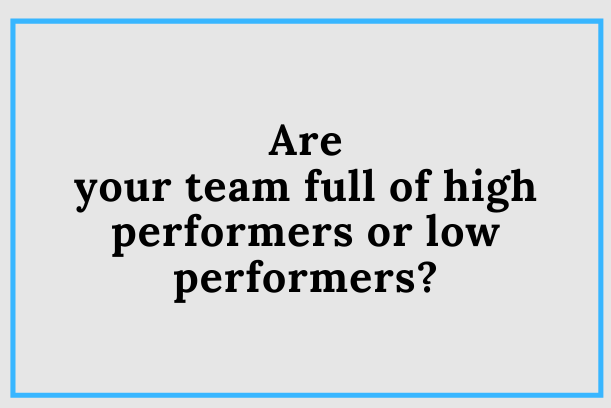Jun06

How would you describe the atmosphere in your team right now? Is it positive? Is it negative? Do the team feel that you care for them? The reason I ask this is because when people leave a team or an organisation, the main reason is not because of the job.
The main reason is because of the relationship they have with their boss. If the relationship is good, then they will tend to stay. If the relationship is bad, then they are more likely to leave. How is the relationship with your team?
If you think back to your career, if you have ever left a job, what was the reason you left that job? Was it because you didn’t like the job, or you didn’t have a good relationship with your boss?
I know for me, when I have left most jobs in the past, it was because of the relationship with my boss. Speaking with my friends and past colleagues, they left their jobs for the same reason too.
In some of the teams I have led, I have had people leave because our relationship was breaking down. That was a failure on my part, but it was something I learned from, and I never let that happen again.
What I found that was even worse was a team member, or team members who disengaged with everything we were doing. They were part of the team physically, but mentally and emotionally they were somewhere else, and didn’t care.
So, they have quit the team, but stay anyway, because they were getting good money. It was my responsibility to deal with that, and the best way to deal with it was to remove them from the team.
If I didn’t remove them then they would influence the rest of the team in a very negative way. My leadership and integrity would also be under question. I couldn’t allow that to happen and removed them ASAP. Once they were out of the team, things improved.

Your best performing team members is who you need to focus on, but if you have team members who are contaminating the rest of the team, then you need to remove them. If you don’t remove them then your best performers will move on.
Other companies or departments would happily take them, and you cannot afford that. So you need to look within yourself, and decide how much you want to keep your best performers. What lengths will you go to, to ensure they stay?
I’ve worked with some really great performers in my career, but I’ve seen some of them reluctantly leave the team, and the company. I was actually one of them.
The reasons we wanted to leave this time was not solely due to the relationship with the boss, it was because we were working with team members who didn’t want to be there.
But, they wouldn’t leave. I found it amazing that they would want to continue being miserable in life, and drag everybody else down to be as miserable as they were. In the end, because our leaders wouldn’t remove these people from the team, we had no choice but to move on.
Making the decision to remove a team member from the team was very tough I found. However, it is something that has to be done. Low performing leaders will not make this decision, and will allow the poor performers to remain in the team.
What the low performing leader doesn’t know is that he/she is dragging the team down by not removing the poor performers.
When I was engineering technical manager for a London based train operating company, I had an issue. The team was very big, and there were a number of poor performers in the team.
I allowed them to stay, and over time the team got worse. My best performers were getting very upset, so the poor performers were removed. What I was upset about was, I should have dealt with it a lot earlier. This was something I learned from, and wouldn’t let happen again.
The reason low performing leaders do not deal with the low performers by removing them, is because of what comes after. They don’t want to go through the process of hiring new people, and interviewing.
They see this as an obstacle, rather than embracing it as a change, or an improvement. So, they choose the easy way out and let the low performers stay. That is how I saw it until I made that tough decision, and would never let that happen again.
A highly effective leader will know very quickly who their low performers are. They will realise that if they cannot grow and develop them anymore, then they will remove them.
A highly effective leader will see this as an opportunity to strengthen the team, by hiring a new team member. By acting this way, the team will start to feel and perform better. Results will improve, and morale will be lifted.
The leader’s influence will increase, and the team will increase their respect and trust in him/her. While the team is one or two positions vacant, the existing team will not mind covering those vacancies. That will show that they respect what the leader has just done for them, by removing toxic people.
Then, when the new team member, or team members are recruited, the best performers will help bring them up to speed. They will lead this new change in the team, and increase their influence further. This will multiply the leader’s influence, and improve morale in the team even more.
At this stage in my life and career, and with the experiences I’ve had leading teams, I know that you need to focus on your best performers. Focus on them by being very deliberate with them. That is how you retain them.

The leadership principles that you are learning, if you apply them, then your best performers will not only stay, but they will thrive. By reading this post I know you want to create a high performing team.
I know you want a team that values you as the leader. I know you want a team that value each other. I know you want a team that work well together. I know you want a team that love working with the organisation.
Your best performers will love increasing their influence, by helping the other team members. They will love multiplying your influence. If you apply what you are learning, you will be on the right path to making this happen for your team.
A low performing leader will more than likely have a team of low performers, and the reason for that is because the insecure leader is a low performer too. To attract and retain good performers, you need to be a great performer.
Then you can develop your good performers into great performers. That is what a highly effective leader does. Is this you?
When you start to apply these leadership principles and you begin to improve as a leader, your team will begin to improve too. As this is happening, you will gain other followers from outside your team.
You will begin to attract good performers who want to join you in the future. Then, as you are growing and developing your team, your best performers will become leaders themselves. They will become good enough to take up your position. Or, they could take up another leadership position within the company.
If they do, then you must feel nothing but pride, and encourage them to move on. Only if that is what they want, and they are ready. If they do move on, you will have attracted other good performers to take their position. So, the recruitment process will become easier for you.
I’ve discussed earlier about my relationship with my engineering director when I worked in Liverpool, and how he put me through University, and developed me.
However, he didn’t just develop me, he developed almost everybody in the engineering department. He was creating leaders within his department.
He focussed on improving everyone’s environment and the facilities, then he deliberately focussed on improving us. He wanted to create leaders, so he would put his best performers through development training.
Then he would give them opportunities to become stars. When he focussed on his best performers and developed them, he would fill leadership positions with the same best performers. The great thing was, they already had the leadership training, and opportunities to practice before they took up the role.
As for me, a leadership position became available in Scotland as an engineering production manager, and he encouraged me to take up that role. The reason he did that was not to remove me from the team, it was because he knew it would be good for me.
He did tell me the pride he felt in helping me get to this position, and I will never forget him for that. He was a highly effective leader.
When you become a highly effective leader, you too will feel the same pride he, me and many other highly effective leaders feel when they help, grow and develop their teams.
I welcome hearing how this post has influenced the way you think, the way you lead, or the results you have achieved because of what you’ve learned in it. Please feel free to share your thoughts with me by commenting below.
All the best,
By Tom Lawrence
Keywords: Culture, Leadership, Transformation
 The Orchestra Needs a Conductor: Why Multi-Model Agents Require H2E Governance
The Orchestra Needs a Conductor: Why Multi-Model Agents Require H2E Governance The Role of Memory in Modern-day Business
The Role of Memory in Modern-day Business The Architectures of Permanence: A Comparative Analysis of the "Big Three" AI Strategies (2026)
The Architectures of Permanence: A Comparative Analysis of the "Big Three" AI Strategies (2026) Friday’s Change Reflection Quote - Leadership of Change - Change Leaders Enable Generational Advancement
Friday’s Change Reflection Quote - Leadership of Change - Change Leaders Enable Generational Advancement The Corix Partners Friday Reading List - February 27, 2026
The Corix Partners Friday Reading List - February 27, 2026